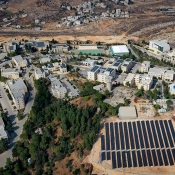Institute of Women Studies organizes a lecture on Challenges to the Decolonization of Feminist Theory”
The Institute of Women’s Studies at Birzeit University, in cooperation with the Ph.D. program in Social Sciences, organized a lecture entitled “Challenges to the Decolonization of Feminist Theory: Reflections from Indigenous Praxis in Latin America.” The lecture was presented on December 9, 2017, by Professor and Senior Researcher at the Center for Research and Advanced Studies in Social Anthropology (CIESAS) in Mexico City, R. Aída Hernández Castillo.
Castillo began the lecture by addressing the recent events concerning Jerusalem: “We’ve always drawn inspiration from the Palestinian people’s struggle. In the 70’s and 80’s, we would always look towards Palestine and draw comparisons with their situation, and it’s truly an honor to stand here and interact with the Palestinian academicians.”
Castello presented the theoretical, methodological and political analysis she developed with a group of women who are academic colleagues and activists that are members of the Decolonial Feminist Network. She stated that they took as a point of departure the questioning of the homogenizing, generalizing perspectives of patriarchy and, what are considered “women’s interests.”
Castello emphasized the contribution of research to knowledge and recognition of the cultural and historic specificities of social subjects. In contrast with the action research, that became popular through all Latin America in the 1970s, the anticolonial feminist research is not based on the premise that we have some historic truth to share; but rather, the purpose is to create a space for dialogue with other women –through research and organizational work– to discuss and analyze the different conceptions and experiences of subordination, resistance and social justice.
Castello addressed the experiences of intercultural dialogues that have taught her very important lessons to decolonize her own feminism and re-think activist research methodologies from a dialogical perspective. She ended by presenting her activist research experience with organized indigenous women through the Zapatista Movement and the Continental Network of Indigenous Women, with whom she learned the need to broaden the conception of gender rights from a non-individualistic understanding of being a woman, and to reconsider the issue of domination by including a more holistic perspective that includes not only the relations between men and women, women and women, and men and men, but also between human beings and nature.






